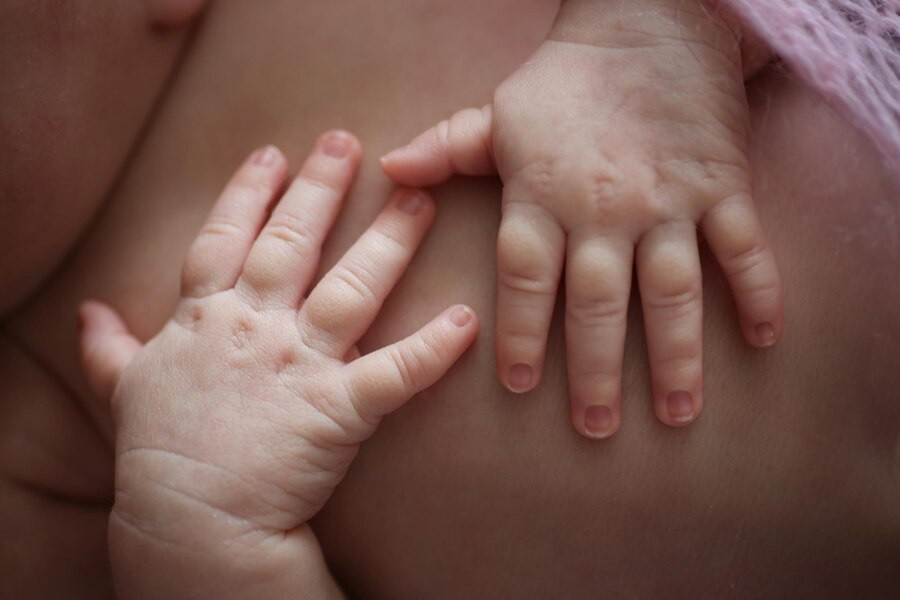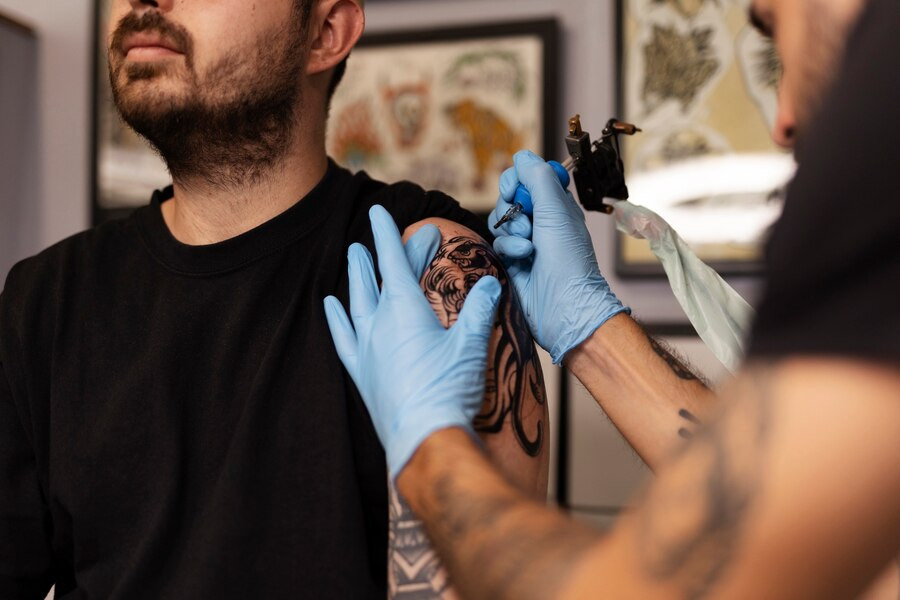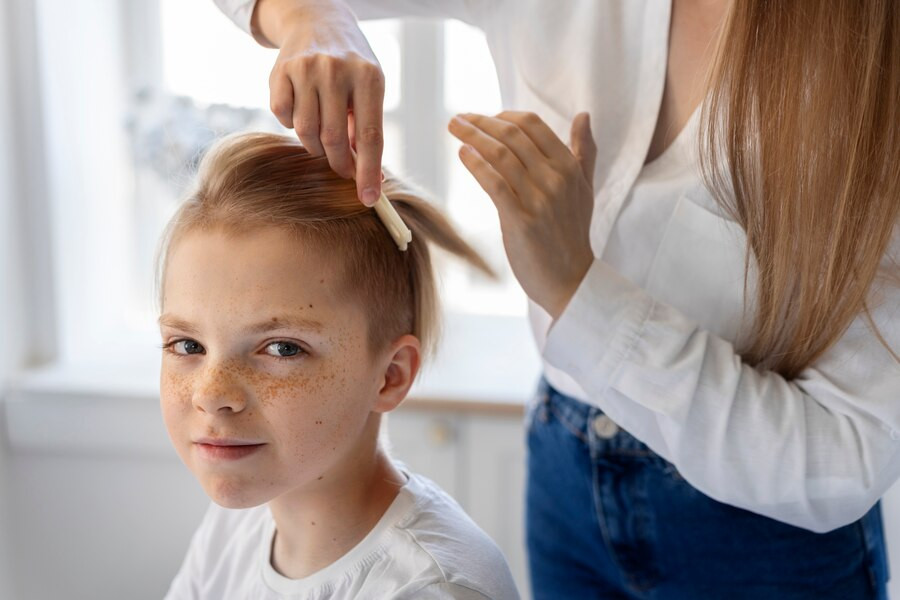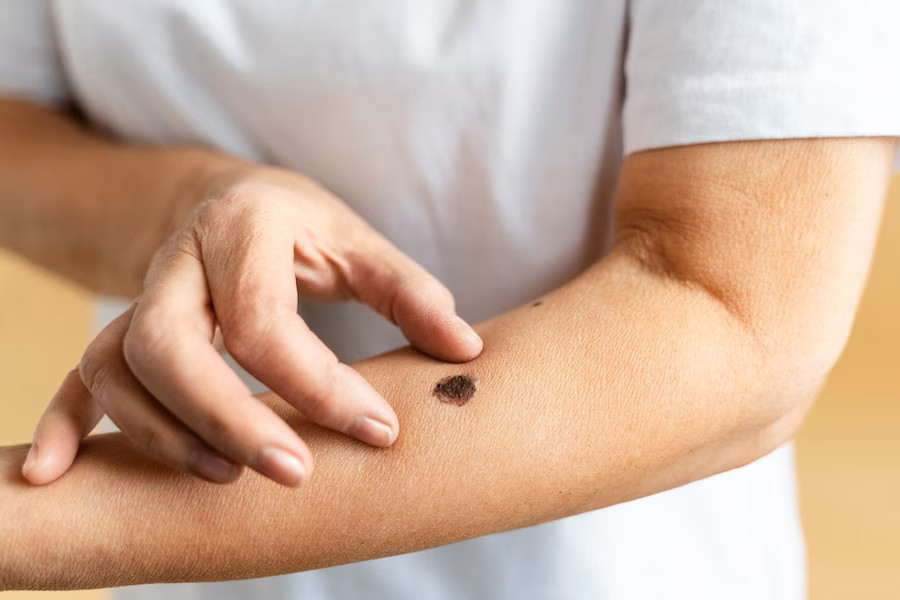Tahi lalat disebut juga dengan istilah melanocytic nevi. Ini adalah pertumbuhan kulit yang umum terjadi pada bayi baru lahir.
Tahi lalat yang terlihat pada saat lahir atau berkembang di 1-2 tahun pertama kehidupannya disebut nevi melanositik kongenital. Meskipun sebagian besar tahi lalat berukuran kecil, sebagian juga akan terus tumbuh seiring dengan pertumbuhan anak.
Tahi Lalat pada Bayi dan Kanker Kulit
Tahi lalat memiliki potensi berkembang menjadi kanker kulit, terutama jika tahi lalat mengalami perubahan atau pertumbuhan yang tidak normal. Anda perlu mewaspadai tahi lalat pada bayi apabila menemukan beberapa hal berikut:
Adanya perubahan
Adanya perubahan pada tahi lalat seperti pertumbuhan yang cepat, perubahan warna menjadi lebih gelap atau terang, perubahan bentuk dan ukuran, asimetris dan adanya batas yang tidak teratur perlu diwaspadai sebagai risiko kanker.
Memiliki ciri-ciri seperti Spitz nevus
Spitz nevus adalah jenis tahi lalat non kanker yang biasanya muncul pada masa kanak-kanak. Tahi lalat ini biasanya muncul sebagai benjolan bulat berwarna merah muda yang bisa terlihat datar atau kasar, memiliki warna biru, hitam atau cokelat.
Meskipun Spitz nevus bukanlah hal yang perlu dicemaskan, Anda tetap perlu membawa bayi ke dokter untuk mendapatkan diagnosis yang akurat dan memastikan bahwa itu bukanlah kanker kulit.
Baca Juga: Penyebab Tahi Lalat Terasa Sakit
Tahi lalat berdarah
Tahi lalat yang menonjol lebih rentan terhadap cedera dan iritasi, namun terkadang tahi lalat bisa berdarah tanpa alasan yang jelas. Jika tahi lalat tampak memiliki luka terbuka, mengalami perdarahan atau pecah tanpa alasan jelas, ini bisa menjadi tanda melanoma.
Jumlah tahi lalat yang berlebihan
Wajar apabila anak memiliki tahi lalat baru seiring bertumbuh dewasa. Rata-rata anak berusia 15-19 tahun bisa memiliki tahi lalat sekitar 12-20 buah.
Jadi apabila Anda menemukan ada lebih dari 50 tahi lalat pada bayi, maka Anda perlu membawanya untuk mendapatkan pemeriksaan dokter. Jumlah tahi lalat berlebihan meningkatkan risiko yang lebih tinggi dalam mengembangkan melanoma.
Tahi lalat yang besar
Tahi lalat umumnya memiliki ukuran yang relatif kecil. Namun, pada beberapa anak tahi lalat yang dimiliki bisa jauh lebih besar.
Memiliki tahi lalat yang berukuran besar meningkatkan risiko terkena melanoma. Anak-anak dengan tahi lalat yang bertumbuh besar sebaiknya mendapatkan pengawasan dan pemantauan untuk mendeteksi perubahan dan tanda-tanda yang mencurigakan.
Baca Juga: Ini Beda Tahi Lalat Normal dan Gejala Melanoma
Perlukah Menghilangkan Tahi Lalat Anak?
Secara umum, tahi lalat pada bayi dan anak tidak perlu dihilangkan, kecuali ada alasan medis atau alasan estetika. Jika tahi lalat mengganggu, terasa tidak nyaman atau sering tergesek, Anda bisa berbicara dengan dokter kulit untuk mengevaluasi perlukan menghilangkan tahi lalat tersebut.
Paparan sinar matahari berlebihan dapat meningkatkan jumlah tahi lalat dan menyebabkan tahi lalat menjadi berwarna lebih gelap. Untuk mencegah timbulnya tahi lalat baru dan melindungi tahi lalat yang sudah ada, sebaiknya berikan tabir surya pada anak-anak dan pakaian yang melindungi kulit ketika berada di luar rumah.
Ingin mengetahui lebih lanjut mengenai tahi lalat pada bayi dan anak-anak? Anda bisa memanfaatkan layanan konsultasi kesehatan dengan mengunduh aplikasi Ai Care melalui App Store atau Play Store.
Mau tahu informasi seputar kehamilan, menyusui, kesehatan wanita dan anak-anak? Cek di sini, ya!
- dr. Monica Salim
American Academy of Dermatology Association. 5 Signs Your Child's Mole Needs to Be Checked. Available from: https://www.aad.org/public/diseases/a-z/signs-your-childs-mole-be-checked
Karen Miles. Moles. Available from: https://www.babycenter.com/health/conditions/moles_1435115
Cincinati's Children (2023). What are Moles (Congenital Melanocytic Nevi)?. Available from: https://www.cincinnatichildrens.org/health/m/moles-congenital-melanocytic-nevi
Natalie Silver (2019). What You Need to Know About a Mole on Your Baby. Available from: https://www.healthline.com/health/skin/mole-on-baby
Skin Cancer Foundation (2021). Melanoma Warning Signs. Available from: https://www.skincancer.org/skin-cancer-information/melanoma/melanoma-warning-signs-and-images/
Cancer Research UK (2024). Symptoms of melanoma skin cancer. Available from: https://www.cancerresearchuk.org/about-cancer/melanoma/symptoms
Cleveland Clinic (2022). Spitz Nevus. Available from: https://my.clevelandclinic.org/health/diseases/24439-spitz-nevus
Amanda Barrell (2024). What causes a bleeding mole?. Available from: https://www.medicalnewstoday.com/articles/322703
Mayo Clinic (2023). Moles. Available from: https://www.mayoclinic.org/diseases-conditions/moles/symptoms-causes/syc-20375200











